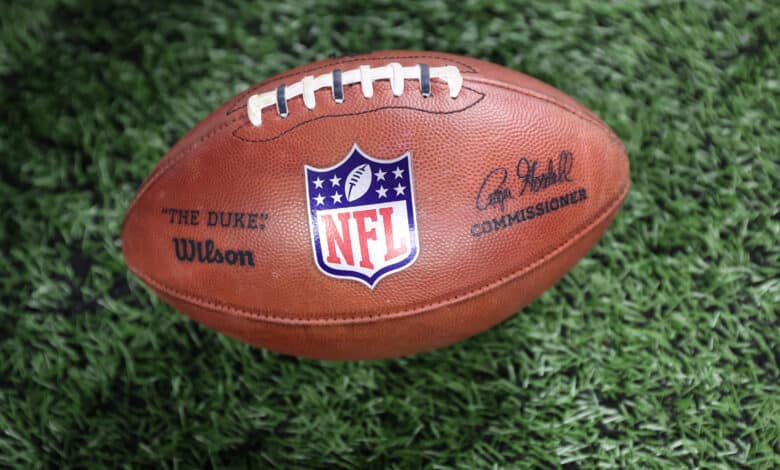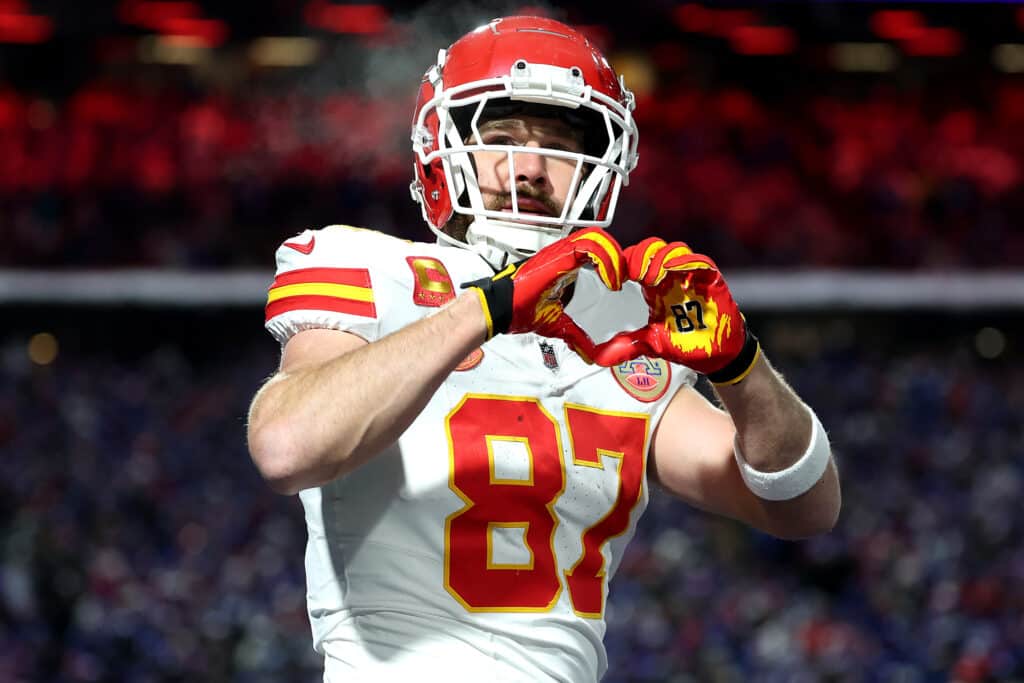
The NFL is a league built on spectacle, drama, and the occasional stat so wild it sounds made up. Over the years, we’ve seen improbable comebacks, statistical anomalies, and moments that defy logic—some so strange they’ve become legendary trivia fodder. Whether it’s a team thriving in utter chaos, players rewriting record books or quirky MVP winners, these stories remind us why football is the ultimate theatre of the unexpected. From Larry Fitzgerald’s jaw-dropping consistency to the Houston Oilers winning games despite throwing picks like confetti, here are 10 unbelievable NFL facts that will make you double-check they’re real.
NFL Craziest Facts
In 2013, the Ravens were down 12-7 to the Vikings with 2:08 left in the game. The Ravens won 29-26 in regulation time…
What do you call a game with six lead changes in the final two minutes? Chaos. The Ravens’ 29-26 victory over the Vikings in 2013 wasn’t just wild—it was an NFL fever dream. Down 12-7 with 2:08 to go, Joe Flacco and the Ravens engineered a comeback for the ages, capped by Marlon Brown’s game-winning touchdown with four seconds left. The snow-covered field in Baltimore only added to the pandemonium, as players skidded and slipped through one of the most absurd finishes in NFL history. It’s a game so bonkers that every replay feels like it’s in fast-forward. It also encapsulates the beauty of football: never, ever leave early.
Here’s how it unfolded: after a Dennis Pitta touchdown put the Ravens ahead 15-12, the Vikings struck back with an 80-yard kickoff return by Cordarrelle Patterson to make it 19-15. Not to be outdone, Flacco launched a 77-yard bomb to Jacoby Jones, swinging it back to 22-19 Ravens. Then Adrian Peterson’s replacement, Toby Gerhart, scored on a 41-yard scamper, leaving just 45 seconds on the clock and a 26-22 Vikings lead. Somehow, that was still too much time for Baltimore, who sealed the madness with Brown’s game-winner in the corner of the end zone. Four touchdowns in two minutes and one unforgettable NFL game.
Not one wide receiver caught a touchdown for the Kansas City Chiefs in 2014
Andy Reid’s offense, without a wide receiver catching a touchdown for an entire season? Sounds impossible, but it happened in 2014. Despite a Pro Bowl year from Alex Smith, the Chiefs’ WR corps turned into an episode of Ghost Hunters. Tight end Travis Kelce and running back Jamaal Charles carried the offense while Dwayne Bowe—a former Pro Bowler—led the team’s wideouts with zero scores. Reid is known for offensive wizardry, but even Houdini would’ve scratched his head at this one. Somehow, the Chiefs still went 9-7, proving that you can survive the NFL without a WR touchdown. Just don’t expect to win a Super Bowl that way.

In 1999, the Jaguars went 14-2 and lost in the AFC Championship Game. All three losses were to the Titans.
The 1999 Jaguars were nearly perfect—except against the Titans. Jacksonville bulldozed the rest of the NFL, finishing 14-2, but somehow dropped all three of their matchups to Tennessee, including the AFC Championship Game. It’s the kind of stat that feels like a glitch in Madden. The Titans had Jacksonville’s number, outmuscling Tom Coughlin’s squad every time they met. The irony? The Jaguars hosted the title game, yet their home-field advantage didn’t matter. To this day, Jacksonville fans cringe at the name Steve McNair, who tormented them that season. It’s a reminder that sometimes, even the best teams can’t overcome their kryptonite.
Larry Fitzgerald was a wide receiver for 17 years. He retired with more tackles than drops.
Larry Fitzgerald is one of the greatest wide receivers in NFL history, but here’s the stat that boggles the mind: he retired with more career tackles (41) than drops (29). That’s absurdly rarefied air. Fitzgerald’s consistency was unmatched—he could be triple-covered and still come down with the ball. But his knack for making tackles? A testament to his hustle and humility. Most of those tackles came after turnovers, and Fitz sprinted back like a linebacker chasing down a running back. It’s the perfect encapsulation of his career: talented, selfless, and never taking a play-off. Forget first-ballot Hall of Famer—he’s a football unicorn.
Legend.
Congrats @LarryFitzgerald on officially being inducted into the College Football Hall of Fame with @Pitt_FB ? pic.twitter.com/BQtnWO2gzq— Arizona Cardinals (@AZCardinals) December 11, 2024
In 1962, the Houston Oilers had five games with five interceptions. They went 5-0 in those games.
The Houston Oilers in 1962 redefined the concept of “winning ugly.” Imagine throwing five interceptions in a game—enough to make most coaches start looking at their backup QB—and still walking away with a win. Now, imagine doing that five times in one season. The Oilers achieved this improbable feat and managed to go 5-0 in those turnover-filled games. It’s one of the most bizarre anomalies in football history.
How did they pull it off? A ferocious defense and a touch of good fortune. The Oilers turned turnovers into temporary setbacks rather than game-killers, often compensating with big defensive plays and timely offensive drives. Led by George Blanda, a quarterback who was as fearless as he was erratic, the Oilers thrived on high-risk, high-reward football. It was the AFL at its chaotic best, with Houston turning disaster into dominance. This stat is proof that sometimes, winning in football is less about perfection and more about persistence.
The 1974 NFL Draft had five future Hall of Famers. The Steelers drafted four of them.
Four Hall of Famers in one draft. That’s not just a good draft—it’s legendary. The Steelers’ 1974 haul included Lynn Swann, John Stallworth, Jack Lambert, and Mike Webster, setting the foundation for their dynasty. Throw in Donnie Shell, an undrafted free agent that year, and it becomes almost comical how well Pittsburgh drafted. It’s a feat so unparalleled that it reads like a cheat code. The Steelers built their dominance in the trenches and the trophy case, and it all started with that draft. Good luck topping that, modern NFL GMs.
In 2006, LaDanian Tomlinson (198) scored more points than the Raiders (168).
In 2006, LaDainian Tomlinson didn’t just break records; he embarrassed entire teams. The Chargers’ superstar running back scored 198 points—more than the Raiders managed as a franchise that year (168). Tomlinson’s 31 touchdowns and 2,323 yards from scrimmage were a masterclass in domination, leaving defenders grasping at air. Meanwhile, Oakland floundered through a 2-14 campaign, barely resembling an NFL team. It’s a stat that’s both hilarious and humbling, a snapshot of Tomlinson’s greatness and the Raiders’ futility.
You just had to be there man, every single touch LaDainian Tomlinson had was a chance for Touchdown ?pic.twitter.com/T3KFwEWKTe https://t.co/FaQqlX5Ynn
— ًBoltUpYo (@BoltUpYo) May 4, 2023
Gale Gilbert is the only player to go to five straight Super Bowls. He lost all five.
Five Super Bowls, five losses. Gale Gilbert’s career is the epitome of bittersweet. As a backup quarterback, he rode the Buffalo Bills’ wave to four straight Super Bowl appearances, only to lose them all. Then he joined the San Diego Chargers in 1994, reaching another Super Bowl—and losing again. Gilbert’s unlucky streak isn’t his fault (he didn’t even play in most of those games), but it’s a bizarre claim to fame. If nothing else, he’s a trivia legend, proving that getting to the Super Bowl is hard, and winning it is even harder.
Cam Newton has two 400-yard passing games in his career. They were the first two games he ever played.
Cam Newton burst onto the NFL scene in 2011 like a meteor, throwing for 422 yards in his debut and following it up with 432 yards in Week 2. To this day, those remain his only two 400-yard games. It’s a stat as strange as it is poetic—Newton’s career has been defined by bursts of brilliance and moments of inconsistency. Those first two games, though, showed the world what Superman could do. While he never became a prolific passer, those early performances cemented his status as one of the most exciting players in league history.
A kicker won the NFL MVP in 1982. A wide receiver has still never won it.
Mark Moseley did the unthinkable in 1982: he became the only kicker to win NFL MVP. It was a strike-shortened season, sure, but Moseley’s consistency (20 field goals in 21 attempts) was crucial for Washington. His MVP win remains a quirky outlier in a league dominated by quarterbacks and skill players. The fact that no wide receiver has ever won MVP, despite the likes of Jerry Rice and Randy Moss redefining the position, makes Moseley’s triumph even stranger. It’s a stat that serves as both a testament to clutch kicking and a head-scratching anomaly in NFL history.
By Nicky Helfgott / @NickyHelfgott1 on X (Twitter)
Follow all the latest NFL news here on 365Scores!



